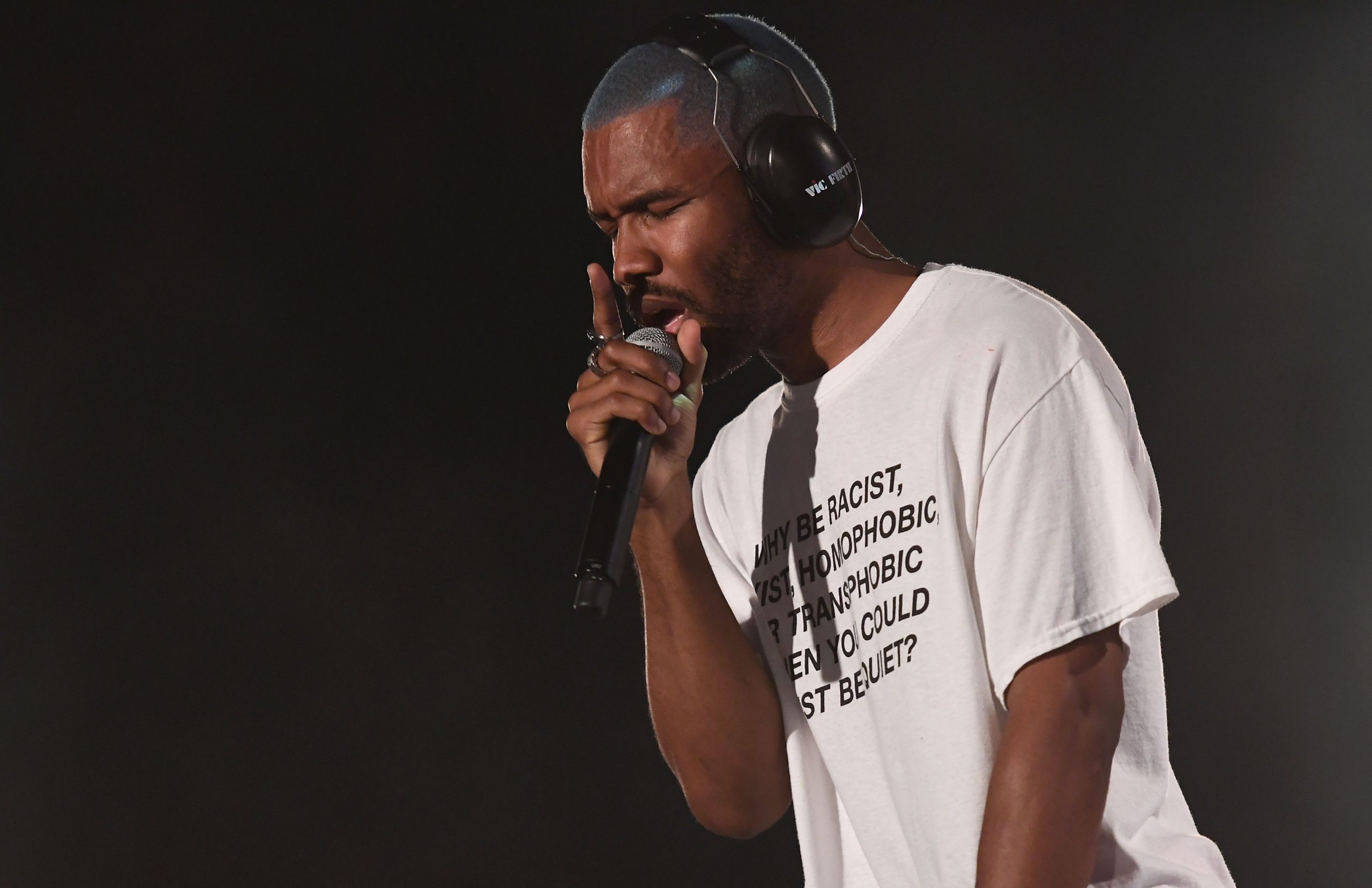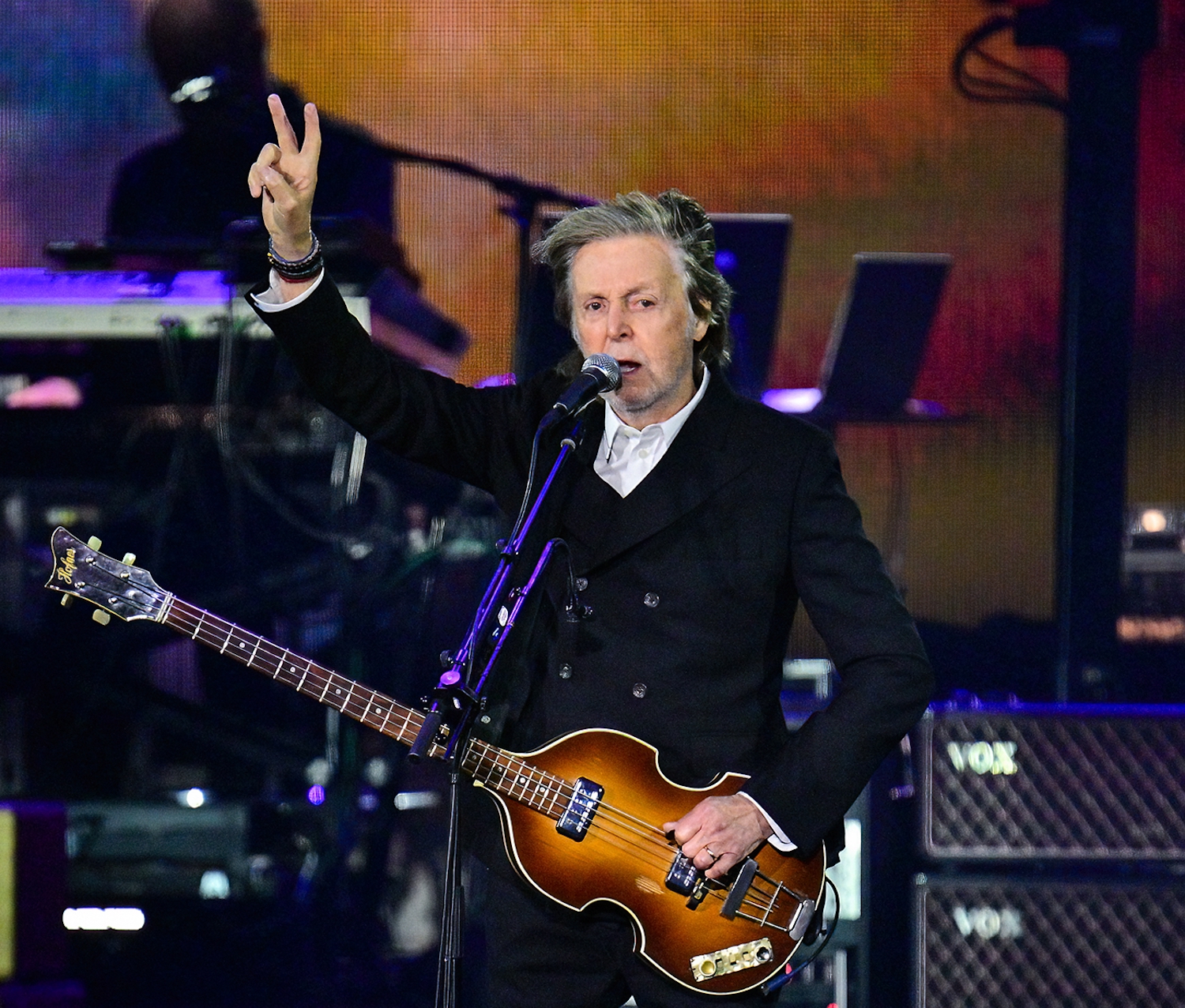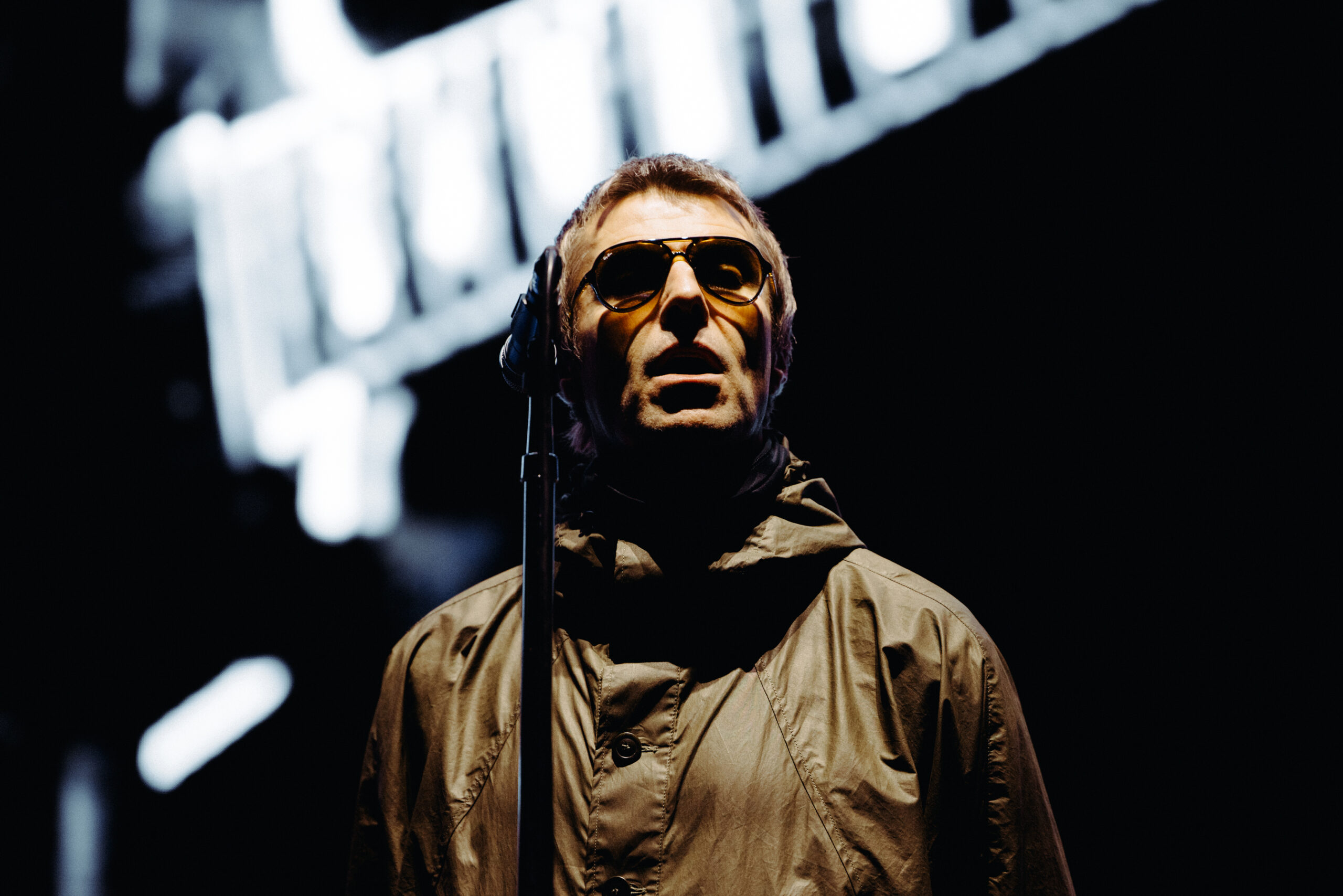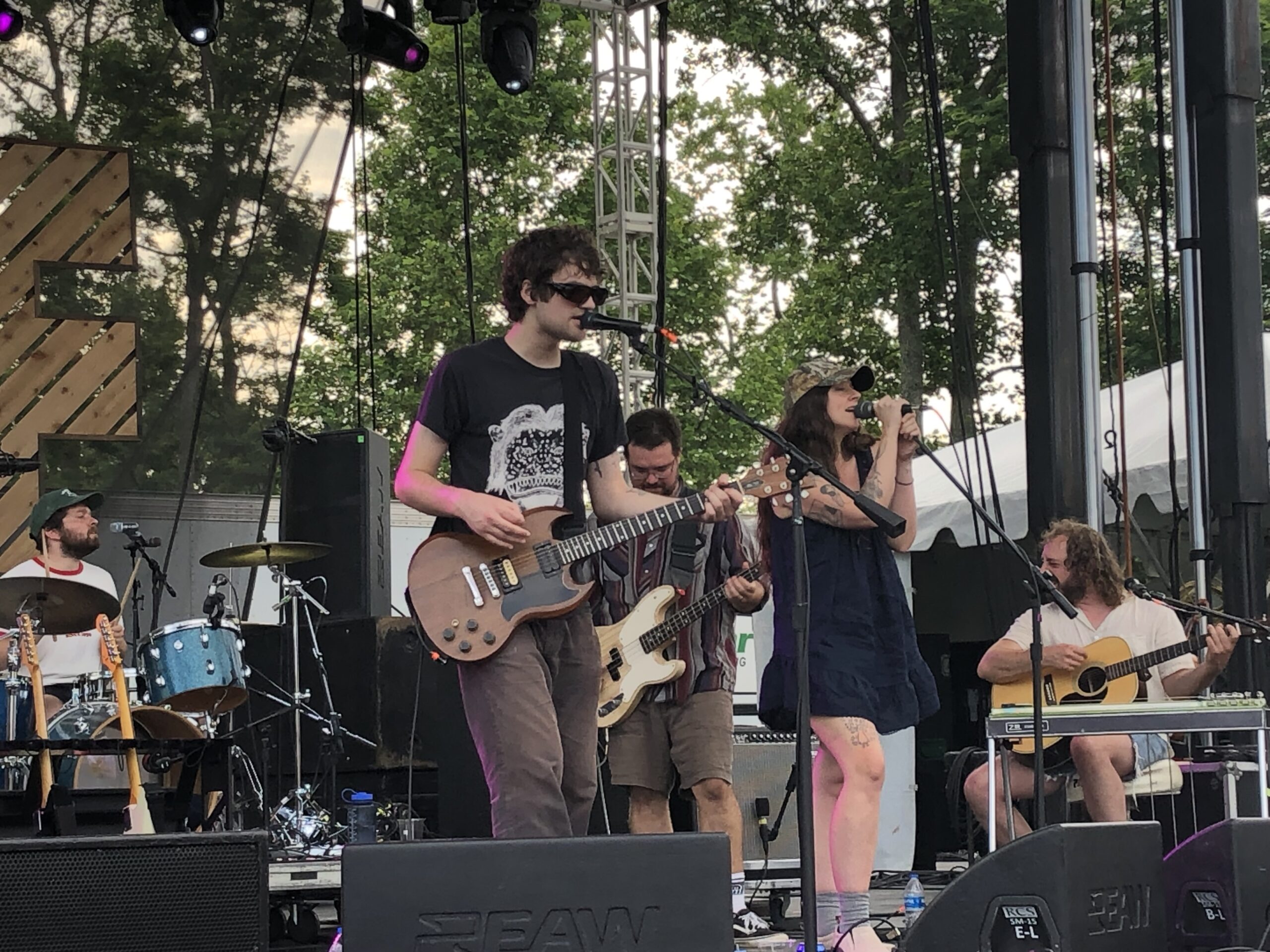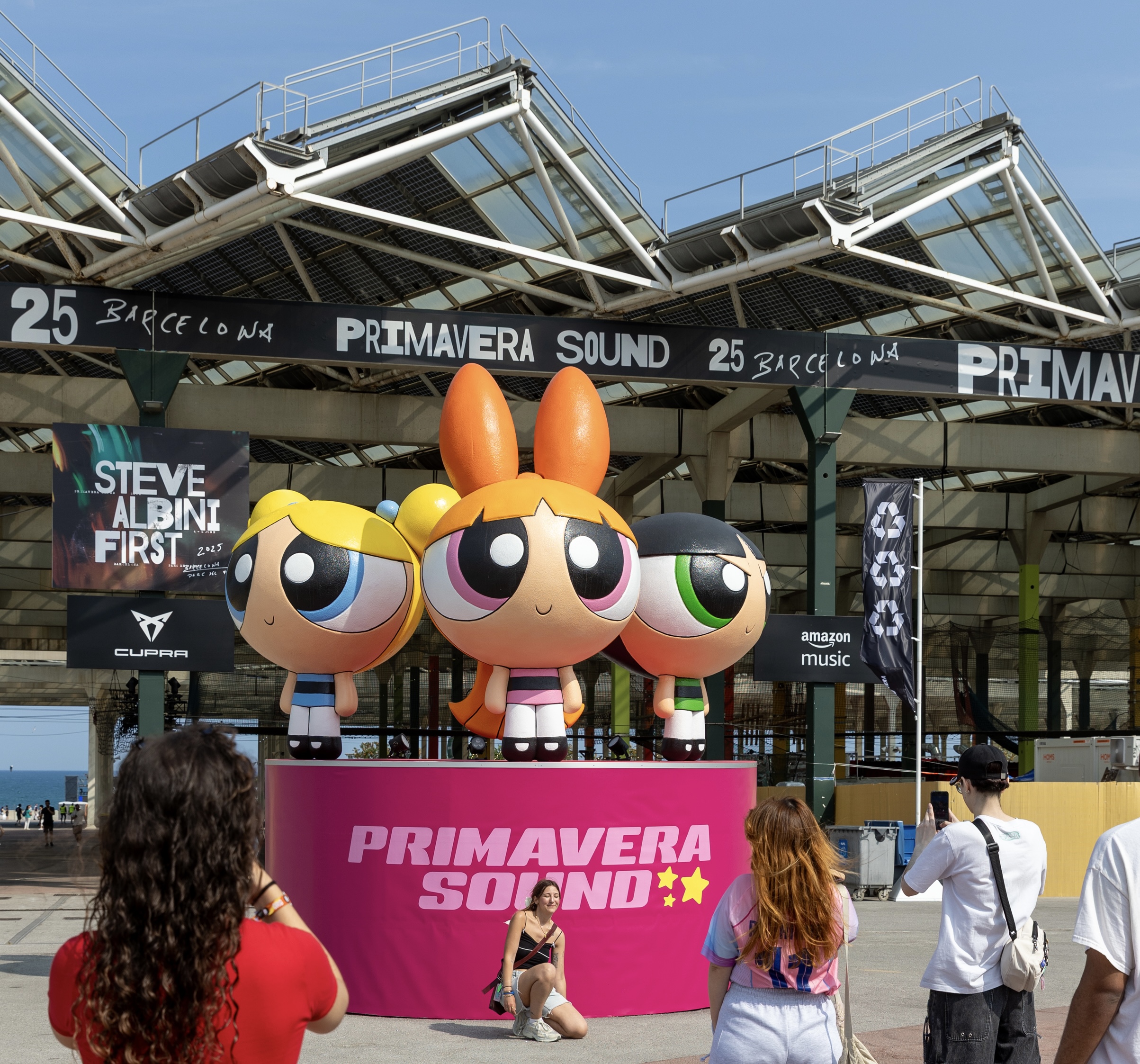One of the best recent Getty Images of Frank Ocean is a paparazzi shot of him wandering around SoHo. Frank’s wearing a T-shirt with a pair of eyes on it, the kind of graphic that Mona Lisas you around a room, and he himself is staring straight into the camera and grinning, flipping off whoever's behind it.
Frank Ocean didn’t let any photographers into the pit last night during his Panorama headline set, and he didn’t let any into the pit at his FYF set last week, either. This isn’t an uncommon practice; a lot of pop stars arrange their own teams to shoot their events, a group of professionals who know how to do the job without getting in the way. A shutter flash can be distracting when you’re stalking a stage in front of thousands of people. But for a performer like Frank Ocean -- who is known for protecting his privacy, who is elusive by definition and wrote an album about it -- that choice was an aesthetic one; a means through which he could parse some of the many themes on Blonde for a live audience.
After Solange closed out her set (which gave me chills and was probably the most flawless festival performance I have ever seen), barely any of us in the crowd moved. People hung their heads and tried to push closer to the stage, hoping to get a prime viewing spot for Frank. (Among them were kids who had waited in line for hours to buy silkscreened Blonde merch before it sold out early in the afternoon.) I happened to be standing next to someone wearing a roadie badge for some other band. She told me that his crew had been working on this rig for hours, that Frank's going to walk out onto a catwalk in the middle of the audience, and that if I wanted to see anything I should go right up to the soundbooth that hovered above the audience some 20 feet from the mainstage. I owe her a drink or something.
Watching Frank Ocean’s team set up was an experience in itself. A soundtrack played while director Spike Jonze and a crew of cameramen set up shots, and stagehands pulled protective tarps off of a towering tapedeck and other set pieces, including a disco ball atop what looked like a watchtower. Someone on Reddit later reported that Jonze went up to audience members and asked them to do certain things during the "shoot," including asking a couple to kiss when Frank sang "Close To You." The most curious part, though, was the tech who checked all of the mics onstage. “Left mic check, right mic check,” the guy repeated, his voice emanating from towers of speakers interspersed throughout the crowd. You don’t usually witness a soundcheck for a performance of that scale. It was another aesthetic choice, one that reminded me of Frank’s Endless staircase. Art is a process, and sometimes you need to see the labor that goes into a work in order to fully appreciate the product, that good art isn't what's perfect -- it's what challenges you.
https://www.youtube.com/watch?v=OLjbIawN2PU
And Frank owned the role of imperfect pop star last night. He walked on to “Pretty Sweet” wearing headphones. He'd dyed his hair blue for the occasion, and his white T-shirt read: “Why be racist, sexist, homophobic or transphobic when you could just be quiet?” The headphones served a purpose, sure, but seeing Frank Ocean surrounded by gear -- a small synth onstage, a tapedeck, a tower of speakers -- gave the audience a sense that we were in a bedroom studio, that we were witnessing an artist at work. Frank slowly walked from the stage out onto the catwalk and launched into “Solo,” then “Chanel.” He paused after that one and looked out at the crowd, tapped his headphones and apologized. He said something about the imaginary friends in his ears talking too loud.
Blonde is an album that critics had some difficulty with. It’s an insular work about celebrity and isolation and relationships starting and ending. It's about falling prey to the dark side of social media and failing to meet expectations and feeling out of control. It’s an album about being adored by the masses and still feeling deeply alone. “By myself,” is what Frank repeats a few times on “Solo,” and it felt heavier to hear him say that standing on a stage in front of a massive audience, his body projected onto three towering screens behind him. Cameramen led by Jonze followed Frank during the set, artfully rendering the experience onstage for anyone who wasn’t able to actually see the stage. That, accompanied by the fact that there were towers of speakers on all sides of the audience gave the sense that you were in a surround-sound movie theater; no one felt the need to push or shove their way to the front, because every angle offered a unique perspective on the show, even if you were a supermodel slumming it with the GA. At one point, the crew filmed their editor working in real time and he typed out a message to the audience on a TextEdit document. The direction on the big screen was like watching a bodega security camera's surveillance footage. The experience of seeing a group of cameramen surround Frank onstage felt like you were watching him get mobbed by the paparazzi. Either way you look at it, that obsessive documentation gave some added weight to lines like "you see me like a UFO."
That tension between the public and the personal is what made Frank Ocean’s set so moving. He’s a god but he’s not a god, a guy who can’t really escape his own head because the outside world demands so much of him. And so instead, he brought us into that headspace, made us feel welcome there, let us take out our phones and film him being filmed by a famous director while he sang songs that are at times so intimate it almost feels invasive to listen. Last night, Frank Ocean welcomed being watched and reveled in it. He made mistakes, too. After asking the audience “How many of you have been in love?” and “How many of you have been through a breakup?” he started “Ivy” and someone missed a cue. He motioned for the band, which included (Sandy) Alex G on guitar, to start over. “The concept behind this [show] is: we’re still learning,” he told the audience at one point.
Blonde’s moving parts don’t always connect in a way that we’ve come to expect from pop music. Some songs, like “Nights,” start off as macro, relatable sing-alongs, and devolve into soft, meditative odes to harder times. Hearing Frank sing the opening to “Nights” in New York City, a place that feels really difficult and chaotic and stressful so much of the time, was beautiful, and it was also a reminder of how universal his particular sense of isolation can be. “Round the city round the clock/ Everybody needs you/ Though you can’t make everybody equal,” everyone shouted along. Frank played a good chunk of songs from Blonde, he covered the Jackson 5 and Buddy Ross, he did "Thinkin Bout You" and Endless' "Commes Des Garçons." The set included 19 songs in total, but that Frank chose to perform "Futura Free" in front of a live audience surprised me. It's the long, meandering song that closes Blonde, an almost paranoid rumination on fame and celebrity culture and the dangers that come with living your life in the public eye. For context: it's the song with the line: "They wanna murder a nigga/ Murder me like Selena." But it's also a song about giving thanks, an appreciation of Frank's mom and his fans, the people who put him up on the pedestal that he reluctantly sits on now. It coasts on a wave of static underscored by a few piano chords, and it's tender and open-hearted and childlike, too, with lyrics that gawk in awe of all that he's accomplished -- not boastful so much as perplexed, like "I can't believe that I am here." And after he cancelled so many festival performances earlier in the year, the audience couldn't really believe he was there either.#FrankOcean does "Nights" at @panoramanyc 🌙 peep (Sandy) Alex G on guitar 🎸 . . 📸: @gabrielajunetc
A post shared by Stereogum (@stereogum) on
